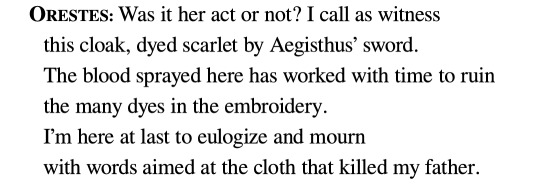#electra (atilius)
Explore tagged Tumblr posts
Text

@finelythreadedsky there is an attested link between Caesar's funeral and the Orestes plays! Not specifically Aeschylus' Oresteia: rather, Atilius' Electra. However, it is hard to imagine Atilius owing nothing at all to Aeschylus, so like. the reception lives and fucks.
"At the funeral games, to rouse pity and indignation at his death, these words from the "Contest for the Arms" of Pacuvius were sung:— "Saved I these men that they might murder me?" and words of like purport from the "Electra" of Atilius." - Suet. Iul. 84.
I do not know enough to talk about whether Shakespeare could be drawing on the Libation Bearers. But here are some other connections that could be interesting to explore:
(1) Appian (Civil Wars 3.143-7) concentrates on the theatrical aspects of Antony's speech, describing it specifically as performance in a tragedy, with the crowd as a chorus. I cannot say to what degree this is constructed by Appian vs. represents what actually happened, but either way this description seems relevant here.
Some quotes:
"Having spoken thus, he gathered up his garments like one inspired, girded himself so that he might have the free use of his hands, took his position in front of the bier as in a play";
"Carried away by an easy transition to extreme passion he uncovered the body of Caesar, lifted his robe on the point of a spear and shook it aloft, pierced with dagger-thrusts and red with the dictator's blood. Whereupon the people, like a chorus in a play, mourned with him in the most sorrowful manner, and from sorrow became filled again with anger. After the discourse other lamentations were chanted with funeral music according to the national custom, by the people in chorus, to the dead; and his deeds and his sad fate were again recited. Somewhere from the midst of these lamentations Caesar himself was supposed to speak, recounting by name his enemies on whom he had conferred benefits, and of the murderers themselves exclaiming, as it were in amazement, "Oh that I should have spared these men to slay me!"";
"While they were in this temper and were already near to violence, somebody raised above the bier an image of Caesar himself made of wax. The body itself, as it lay on its back on the couch, could not be seen. The image was turned round and round by a mechanical device, showing the twenty-three wounds in all parts of the body and on the face, that had been dealt to him so brutally".
(2) A contemporary figure had a connection with Orestes: Octavian was described and self-presented thus (Champlin's article - cited in the next paragraph - deals with this in detail in the Orestes section). [Later Nero (Antony's descendant on both sides and his "double" according to some) becomes the most famous Roman Orestes, but this is perhaps less relevant to the discussion.]
(3) Drawing on the house of Atreus plots to describe contemporary politics was very much expected in 1st century bce Rome: cf. for example Matthew Leigh - Varius Rufus, Thyestes, And The Appetites of Antony; Edward Champlin - Agamemnon at Rome: Roman Dynasts and Greek Heroes.
Tangent: I do not know who first presented Caesar's spirit as bursting out from hell accompanied by the Furies, but the image already in place in 16th century plays (e.g. the anonymous tragedy of Caesar's Revenge, written a few years before Julius Caesar) and I would expect it to have an earlier source. Would love to know where it came from. There might be a connection to Agrippina's ghost in the tragedy Octavia who very much bursts out from hell in this manner (I've tried to draw some connections with the ghost of Julia and of course the blueprint Clytemnestra here).


So I was thinking about how this is very Antony's funeral speech: the body is substituted by a piece of clothing, a (theatrical) device.
And then there are also the dogs of war.

[All quotes are from Libation Bearers trans. Sarah Ruden.]
#libation bearers#oresteia#oresteiabookclub#julius caesar#electra (atilius)#suetonius#appian#theatre tag
19 notes
·
View notes